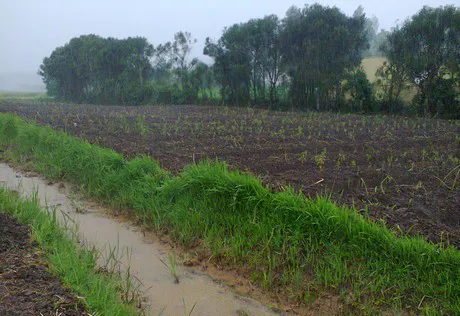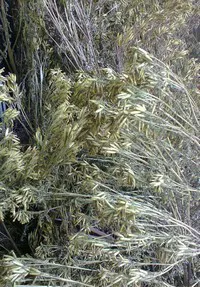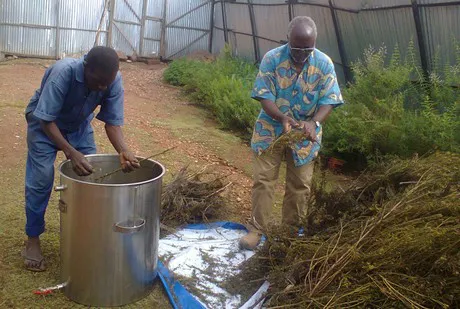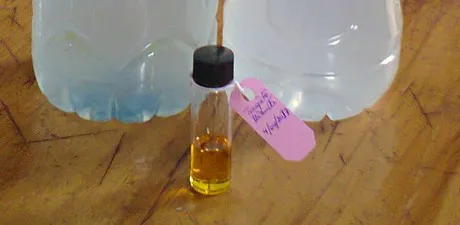
Tagetes minuta grown in the field.
Tagetes minuta
The Tagetes minuta is a
 type of Marigold that is abundantly available in Rwanda, but its potential has not been explored yet. "People here in Rwanda see it as a weed. However, according to several researches, it is a plant that can be used for many applications, but only if the growth, harvest and processing of the plant is being controlled. Then, one would be able to reach good quality oils." And these oils seem to be good organic substitutes in many areas. "It can be used in the pharmaceutical industry, for food and beverage additives, but also in the horticultural industry as a crop protection product and a disinfection tool. It is proven to be an organic pesticide, herbicide, fungicide, bactericide and it can clean all the tools, like cutters, buckets and so on, that are used in the greenhouse. Additionally, it is very powerful to nematodes, it kills and repels everything that needs to be killed or repelled
type of Marigold that is abundantly available in Rwanda, but its potential has not been explored yet. "People here in Rwanda see it as a weed. However, according to several researches, it is a plant that can be used for many applications, but only if the growth, harvest and processing of the plant is being controlled. Then, one would be able to reach good quality oils." And these oils seem to be good organic substitutes in many areas. "It can be used in the pharmaceutical industry, for food and beverage additives, but also in the horticultural industry as a crop protection product and a disinfection tool. It is proven to be an organic pesticide, herbicide, fungicide, bactericide and it can clean all the tools, like cutters, buckets and so on, that are used in the greenhouse. Additionally, it is very powerful to nematodes, it kills and repels everything that needs to be killed or repelledand is completely harmless to humans."
Cultivation in Rwanda
So, about six months Nsenga planted the first Tagetes minuta on his experimental plot in Kigali, Rwanda's capital that is situated roughly in the middle of the country. "The conditions to grow these plants are great in Rwanda. It is thought of a weed and when people saw me planting it, they thought 'this old man is crazy'", he laughs.

Processing the Tagetes minuta (Nsenga on the right).
Last month, he extracted the first oils from the plant and sent them to the laboratory in Kenya where they will identify the chemical components in the oil, because these seem to vary per agricultural zone. "A Kenyan researcher found out that the chemical components of the oils differ per agricultural zone. In Rwanda, we have about five different agricultural zones, which makes the cultivation of this product even more interesting. I already asked some growers in different zones to cultivate this crop for me. This will enable us to discover what chemical components we have specifically in Rwanda."
Organic crop protection product
Nsenga has high hopes for the Rwandan Tagetes minuta oils to be a organic crop protection product of first choice. "Several research labs tested the effectiveness of the oils out of these plants. The oils out of my Rwandan plants, however, have not been tested yet. I have informally tested them on my weeds in my plot and I am satisfied with the results. As the oils have not been officially tested on a flower crop yet, this will be the next step. A friend of mine is a professional flower grower and he will test it and will provide me with the exact data."

The oil extracted from the Tagetes minuta.
If the oils of these Rwandan plants turn out to be a good organic crop protection product, Nsenga is sure that it will be an interesting product for European organic flower growers. "In addition to a wide range of chemical components that would be available from different ecological zones, the costs to acquire Tagetes will be much less compared to other organic crop protection products, because the production costs are very low here. And I am not sure, but I even think that the production costs are even lower than in India and in some other countries where this plant grows. Besides that, because we are in the tropics, we can grow and therefore supply fresh extracts year round."
For more information
NINAF Ltd.
Francois Nsenga
Email: nsenga@ninafconsult.co.rw
www.ninafconsult.co.rw
